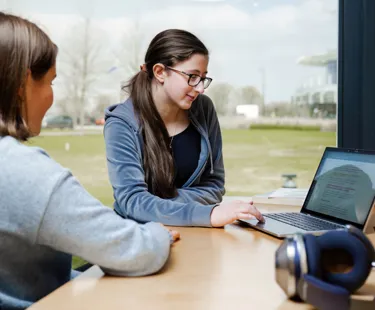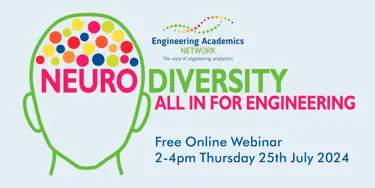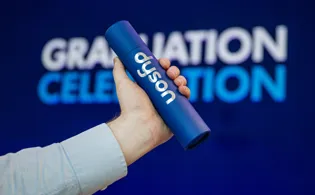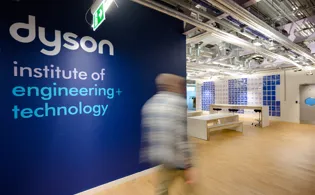
How the Dyson Institute of Engineering and Technology Supports Disabled and Neurodiverse Students

On June 20th, the Dyson Institute will be hosting ‘Co-Designing a Neuro-inclusive Future’ for the Engineering Professors’ Council (EPC) – a continuation of their ‘All in for Engineering’ strand of work that started to bring the engineering education community together around neurodiversity last October. In this blog, Beverley Gibbs and Corianne Gjertsen from the Dyson Institute talk about the event and the Institute’s own approach to supporting neurodiverse students.
Beverley, what is this week’s event all about, and what are you hoping to achieve?
This week, the EPC is bringing together teams from more than 10 different universities to start to define a neuro-inclusion maturity framework for engineering education. By the end of the day, we want to have worked out the domains that would be in such a framework and have started to populate the extremities in such a framework. We want to have agreed next steps, and above all have established a productive co-design approach.
And what does ‘co-design’ mean in this context?
Co-design is a participatory approach where different people are treated as equal members in the design process, recognising that relevant experience and expertise lies in many different places. We wanted students to be meaningful collaborators in this work – thinking about this with them rather than for them. So, the event on Thursday brings together these three constituencies from the very beginning: students, professional services colleagues, and academics.
This sounds great! – how can more people get involved?
So, the next step is a webinar on Thursday 25th July at 2pm. We will be sharing back what happened at the co-design event, have another co-design activity, and continue building a community of people who want to see engineering education become more inclusive. This is open to all and you can pre-register here.
Disability support is an important part of the student support structure at the Dyson Institute, to learn more about our approach we spoke to Corianne Gjertson, Senior Student Support Advisor (SSA)
Corianne, how do we support neurodiverse students at the Dyson Institute?
Well, we take a three-pronged approach to disability and neurodiversity support:
- We anticipate a level of need and ensure the course is inclusive from day one.
- We design detailed packages of support for those with a higher level of need.
- We celebrate the differences in our community by raising awareness.
Would you be able to explain a bit more about what it means to ‘Celebrate differences?’
We understand that each student brings unique strengths and perspectives, which enhance our learning community. Our approach includes:
- Inclusive Curriculum: We ensure that our curriculum reflects diverse perspectives, allowing all students to see themselves represented and valued.
- Diversity and Inclusion Training: We provide training sessions for staff and students to build an understanding and appreciation of neurodiversity and disabilities, and fostering a supportive community.
- Neurodiversity Celebration Week: A notable week in our calendar which sees our students and Institute staff collaborate with colleagues across Dyson to engage with simulation labs, open talks, panel discussions and guest speaker events to showcase and celebrate our differences.
Great, and what about anticipating needs?
From the outset, we work to anticipate the needs of our students. Our support structures are designed to ensure that every student can thrive academically, socially, and personally.
- Cognassist Screening: Before students even begin their journey with us, they have access to a Cognassist screening assessment. This screening is a valuable tool for providing students with personalized insights into their cognitive strengths and areas for development. Using the results of the assessment students can create effective study plans, access tailored support, and adopt strategies that enhance their learning experience. Ultimately, this leads to greater academic success and a more fulfilling educational journey.
- Reasonable Adjustments: We work with our students to make reasonable adjustments in teaching, learning, assessment, and the workplace to accommodate individual needs. This might include flexible deadlines, assistive technology, alternative assessment methods, or adjustments in the workplace environment such as increased 1-2-1 support, mentoring and access to alternative working spaces. All students who have shared with us information about their disability, neurodiversity and/or learning need, will be invited to a conversation with a Student Support Advisor to begin building their support package.
And what about individuals who may need further support?
We offer comprehensive support services to ensure that all students have the resources they need to succeed.
- Student Support Team: Students have access to a dedicated Student Support Team throughout their student journey. I lead the operation of service for disability and neurodiversity within our student community, and students can book a ‘Disability and Neurodiversity support meeting’ any time during the year to receive tailored support.
- Talking Therapies and Clinical Psychologist Support: We facilitate access to talking therapies and our onsite clinical psychologist, helping students manage their mental health and well-being. We encourage students who are exploring a diagnostic assessment to engage with this support at any stage during their journey if needed.
- Assessment Pathways for ASC and ADHD: We support students in accessing assessment pathways for Autism Spectrum Condition (ASC) and Attention Deficit Hyperactivity Disorder (ADHD), ensuring they receive the necessary diagnoses and support.
- Sensory rooms: We often make use of established sensory spaces across all sites where students can regulate their sensory experiences. These spaces may include dim lighting, comfortable seating, and sensory tools.
How do you collaborate with our students as partners within this work?
We believe that students are the best advocates for their needs. Valuing their input is integral to our approach.
- Student Feedback: We regularly seek feedback from our students to refine and enhance our programmes, accessibility (including facilities), support services and community. We do this through surveys and questionnaires, annual course evaluations, focus groups and informal feedback channels. We believe that student feedback is essential to ensure that we remain responsive to the evolving needs of our community and our students’ aspirations.
- Student Representatives and Committees: Each cohort has elected student representatives who act as a liaison between the student body and the Institute and sit on Academic Council. Our Diversity & Inclusion rep and our Wellbeing rep work closely with several Institue teams on a variety of initiatives ensuring that the student voices are included and are part of decision-making processes.
Is there a wider community of support at Dyson and the Dyson Institute?
Community support is crucial for the wellbeing and success of disabled and neurodiverse students. The Institute is home to several societies and networks aimed at fostering peer support, sharing experiences:
- Dyson Institute Neurodiversity Group: Celebrating the strengths and unique perspectives of neurodiverse individuals, this group provides us with insightful monthly articles, including articles on reasonable adjustments, comorbidity, defining what is neurodivergence and how it differs from neurodiversity. The group aims to educate the broader student body about neurodiversity while providing a platform for neurodiverse students to share their insights.
- Neuro-Inclusion Champions: We are excited to have two Dyson Neuro-Inclusion Champion in our Institute community. The Neuro-Inclusion Champions work collaboratively with the business to create a workplace that embraces and values neurodivergent individuals by fostering a culture of acceptance, support, and empowerment to continuously maintain a diverse and thriving work environment.
- (New) Disability and Neuro-Inclusion ‘listening group’: This student-led group provides a safe space for students to connect, share experiences, and support one another. Themes of a session can include disability and identity, discussing experience with using support services and assessment providers, societal issues/ themes relating to disability, issues/ themes relating to disability in higher education, campaigns and identifying opportunities for continued peer support.
Outstanding Recognition and Inclusive Teaching
The Dyson Institute's commitment to excellence in inclusive education has been recognised through our 'Outstanding' award from Ofsted. This highlights our dedication to providing high-quality, inclusive teaching that meets the diverse needs of all our students. Our academic team are innovative with their teaching methods and ensure accessibility and engagement for everyone, making the student experience enriching and inclusive.
Continuous Improvement
At the Dyson Institute, our commitment to supporting disabled and neurodiverse students is ongoing. We continually seek ways to improve and enhance our services, ensuring that every student has the opportunity to achieve their full potential.
Conclusion
The Dyson Institute of Engineering and Technology is dedicated to creating an inclusive and supportive environment for all. By recognising and celebrating differences, anticipating needs, valuing student input, and fostering a strong community, we ensure that disabled and neurodiverse students can thrive. Our holistic approach to support, coupled with our outstanding academic programmes, reflects our commitment to building a better, more inclusive future for all.
Corianne Gjertsen is Senior Student Support Advisor in the Dyson Institute of Engineering and Technology, with a particular focus on supporting students with specific learning needs, disabilities and neurodiversity.
Beverley Gibbs is Director of the Dyson Institute. She has a diagnosis of ADHD(PI), is a member of the EPC’s Education, Employability and Skills Committee, and is the HE representative on the IET’s Foothold programme ‘Engineering Neurodiverse Futures’.


